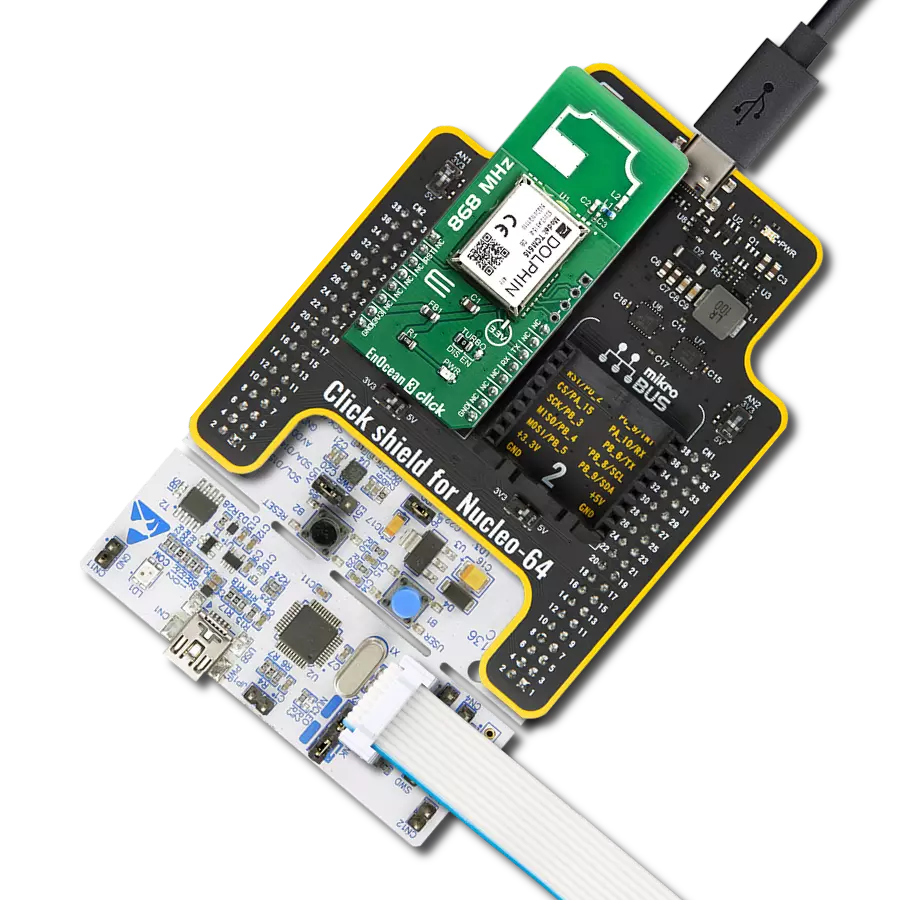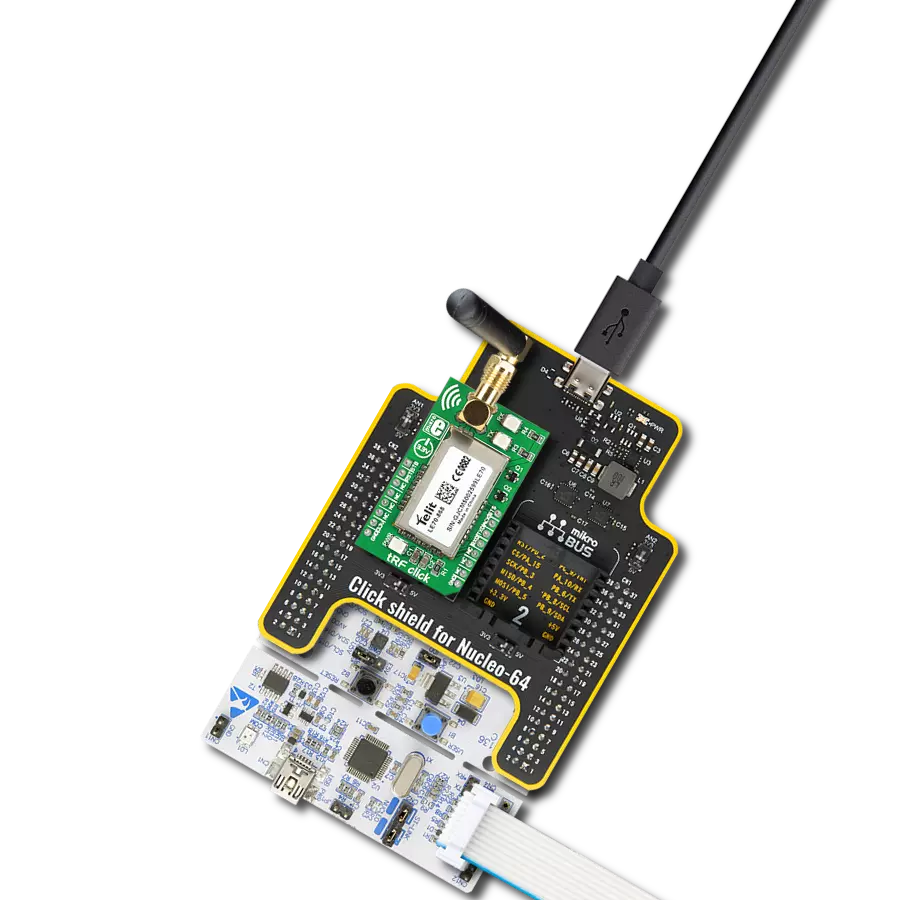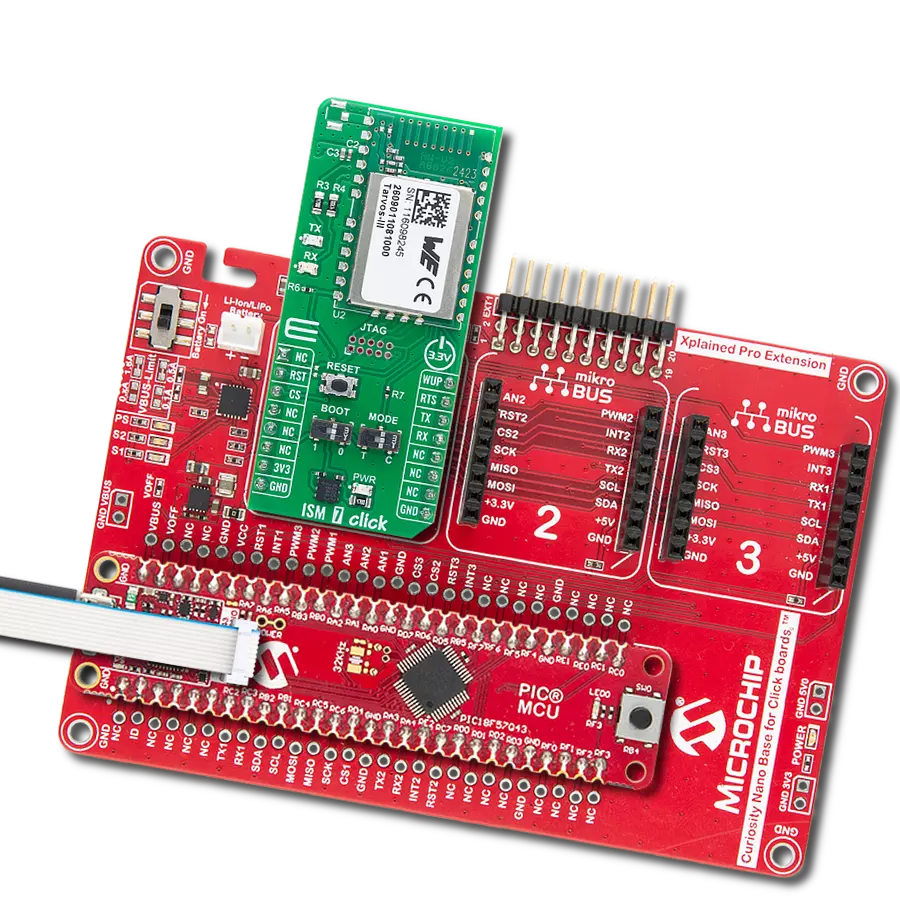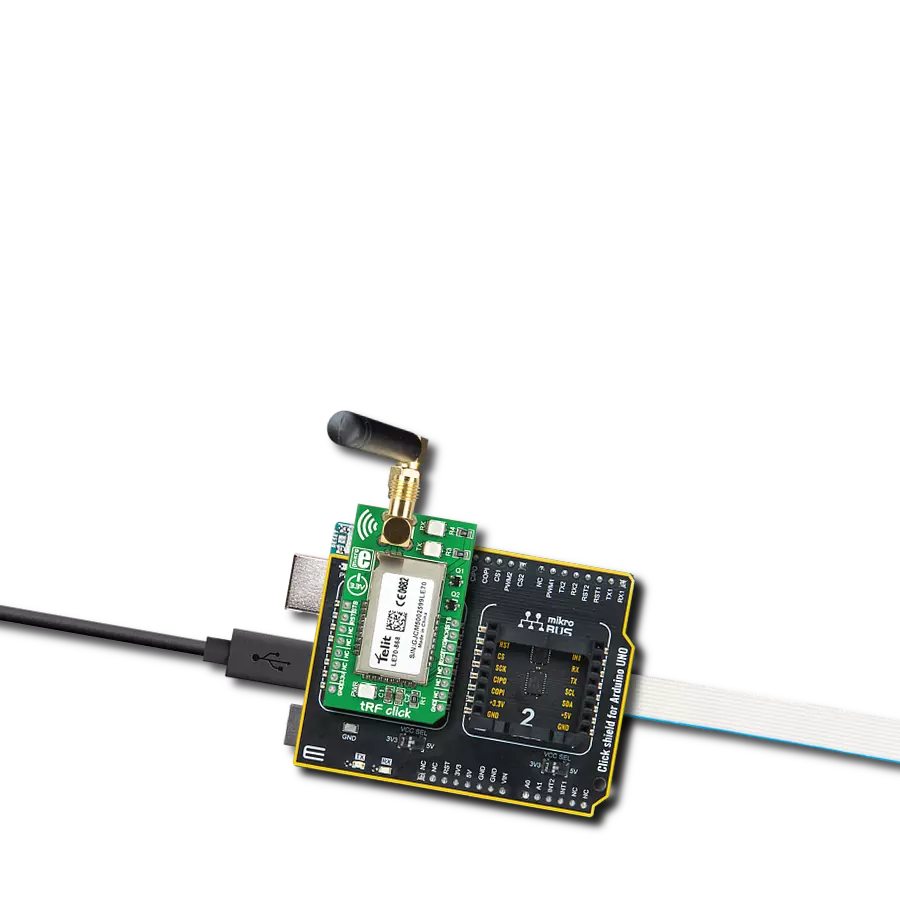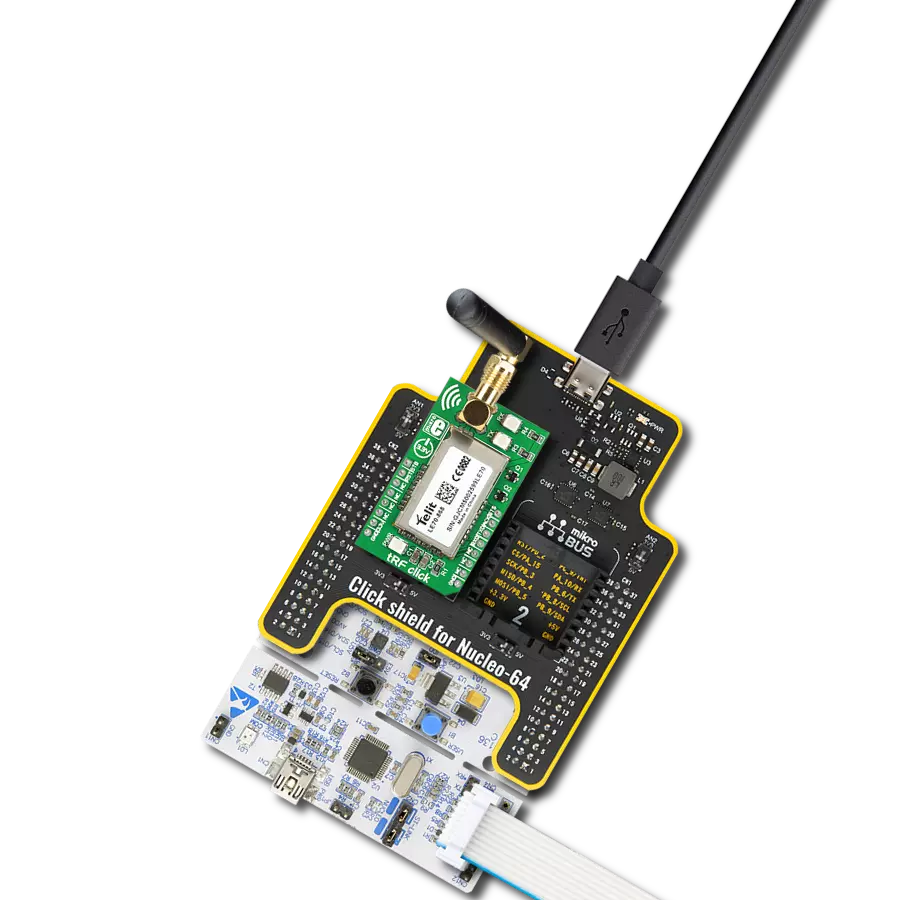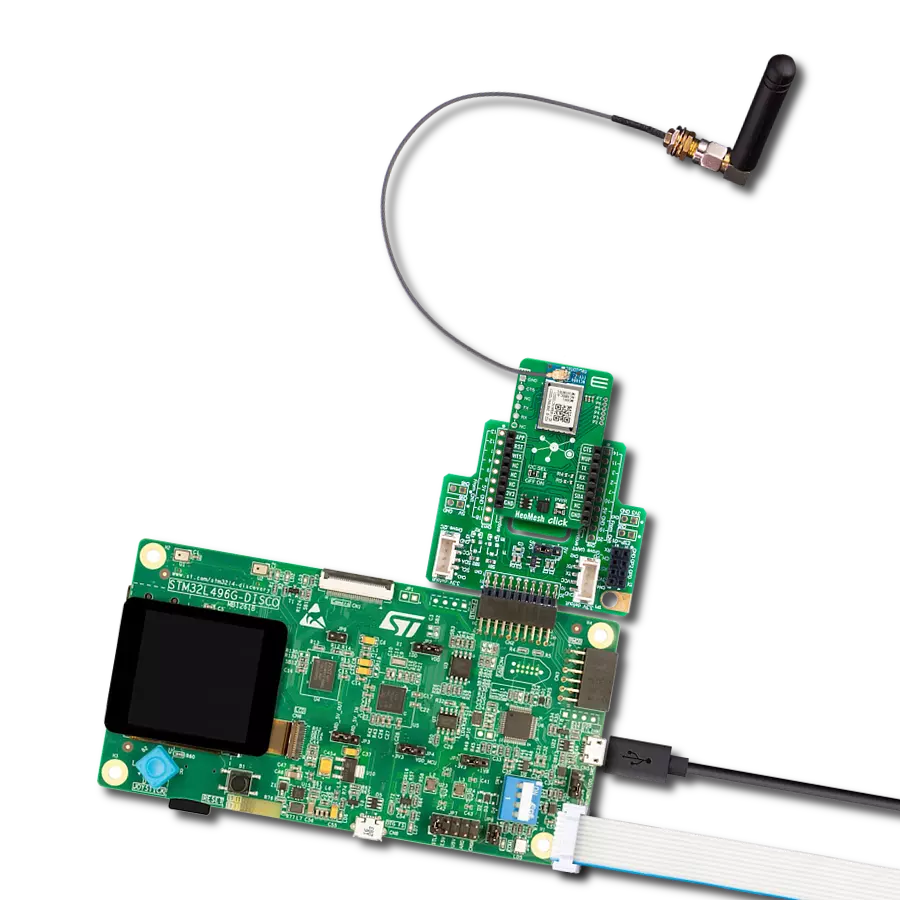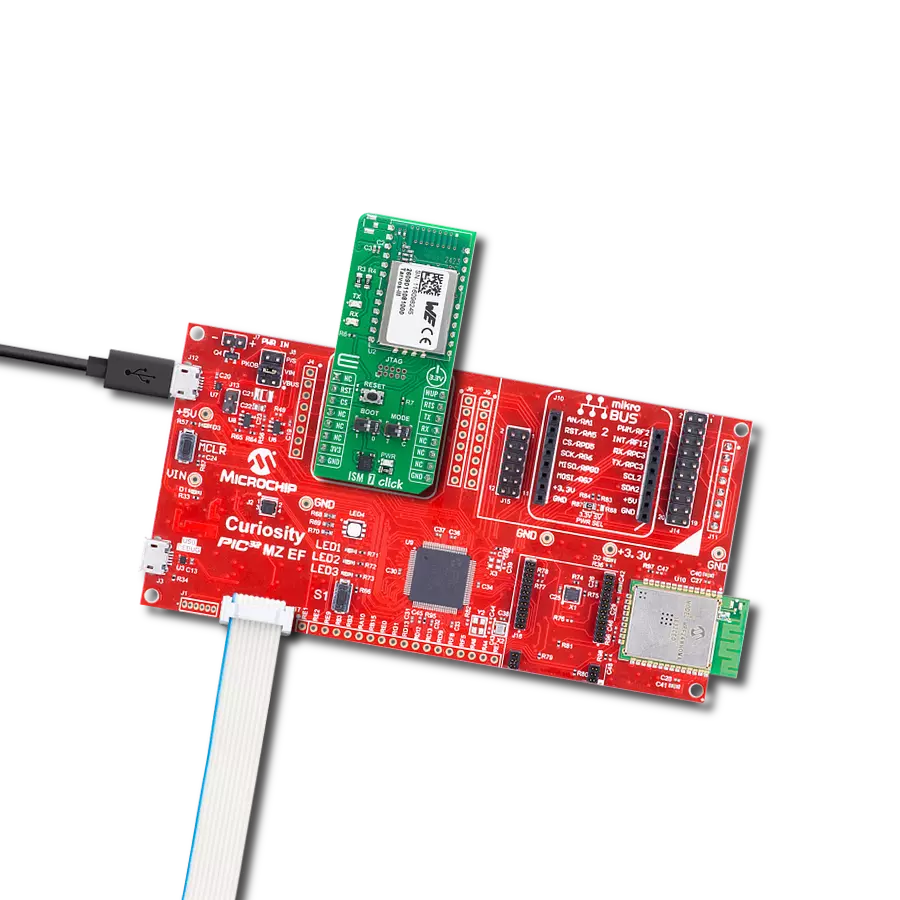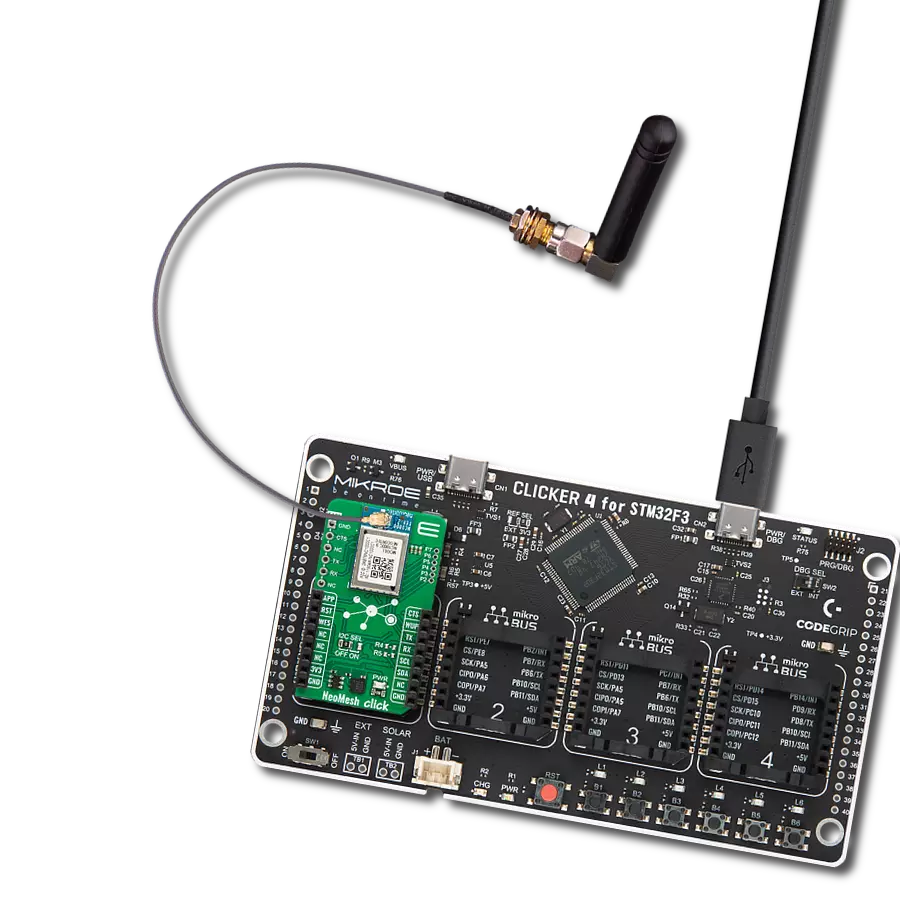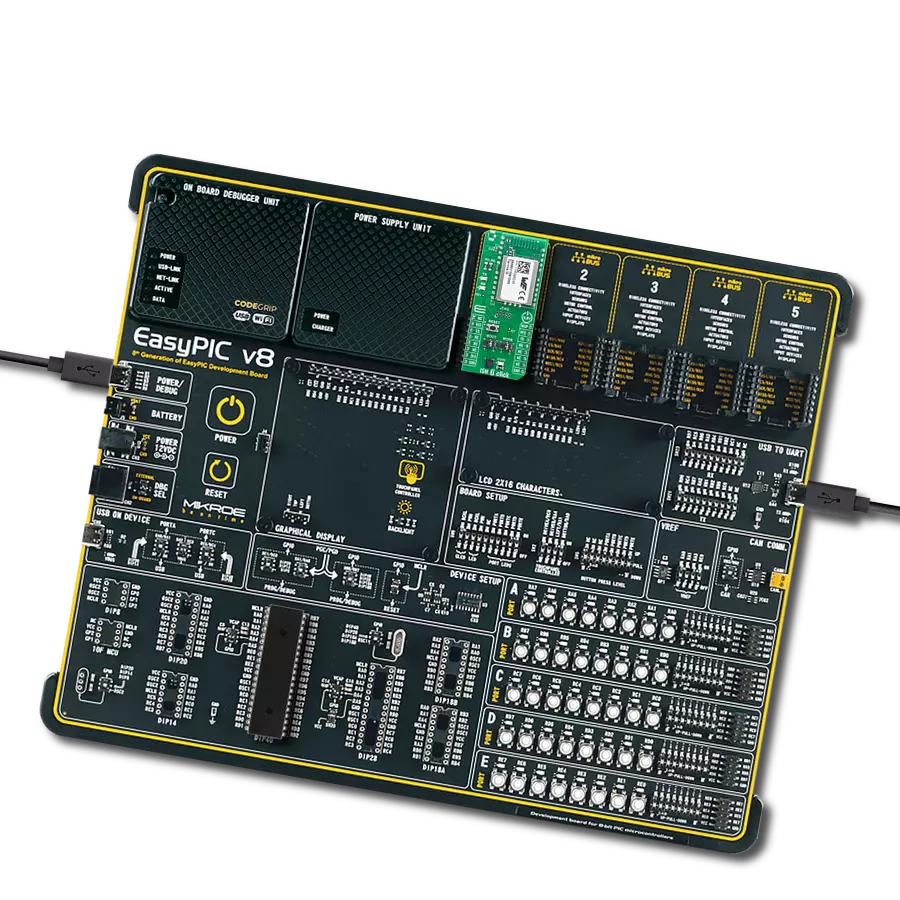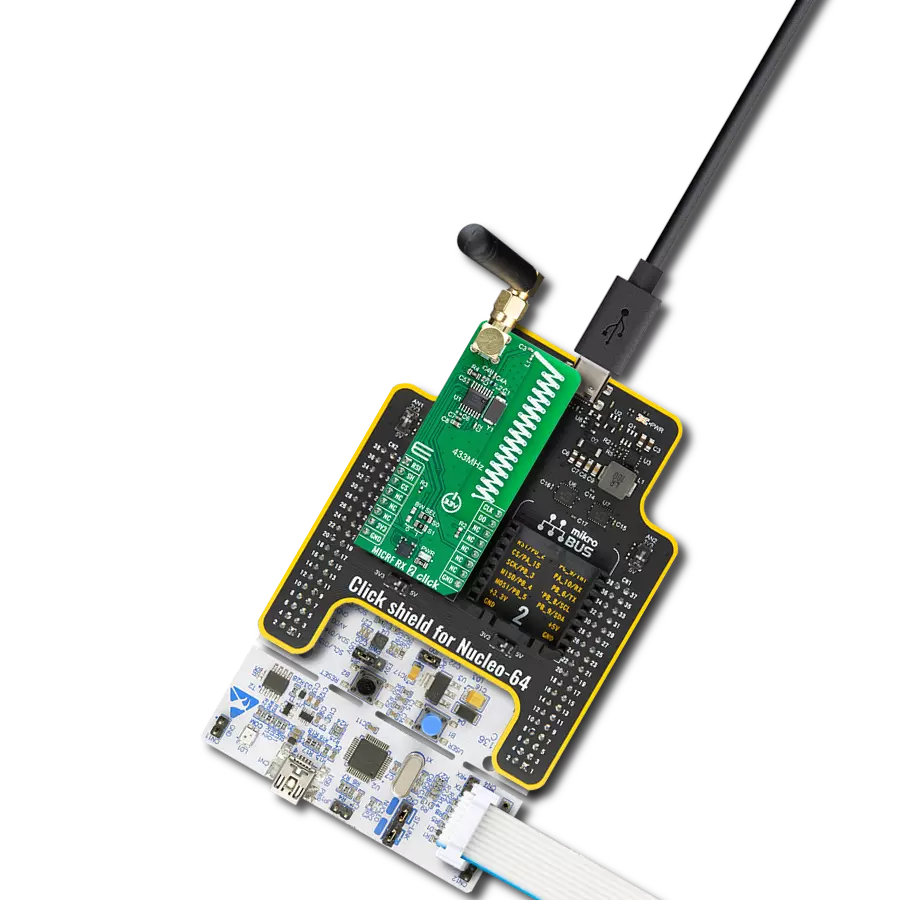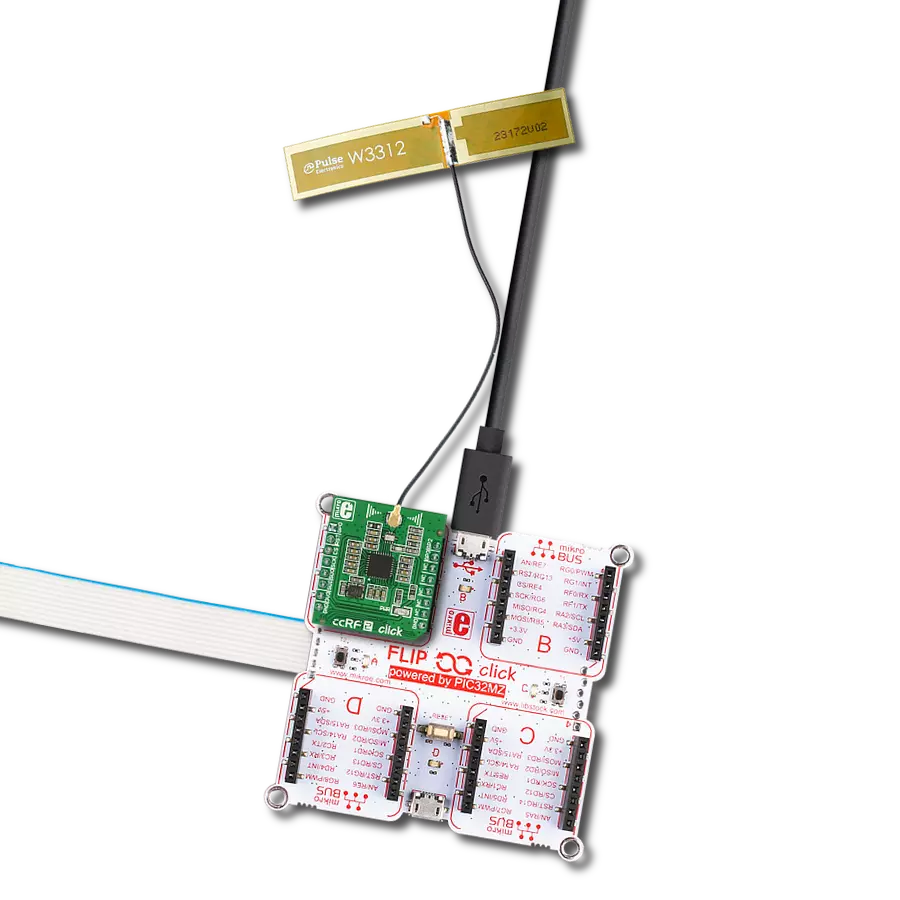以效率和连接为重点,我们的EnOcean收发器网关模块为您的物联网项目打开了通往更加光明、更加连接的未来之门。
A
A
硬件概览
它是如何工作的?
EnOcean 4 Click基于EnOcean的TCM515U,这是一个在902MHz无线电频段运行的收发器网关模块。它的完全集成的无线电功能使得它可以通过板载PCB天线与其他设备进行通信,因此在测试此设备时不需要额外的天线。TCM515U可以在三种功能模式下工作:电报接收、电报发送、低功耗睡眠。在接收模式下,TCM515U处理接收到的无线电电报,并验证正确的帧结构和校验和。在发送模式下,TCM515U接收来自外部主机的待发
送无线电电报,通过其ESP3接口发送。TCM515U可以设置为低功耗睡眠模式,一段时间后自动唤醒并转换回接收模式。每个TMC515U模块都包含其自己的EnOcean唯一无线电ID(EURID),可以在传输过程中用于数据身份验证。除此之外,还可以根据正在设计的应用程序设置每个模块的基本ID或广播ID。另一个重要的功能是SLF(安全级别格式),它指定了用于与特定设备通信的加密、身份验证和滚动代码算法的参数,使得
TCM515U可以使用基于16字节安全密钥的AES128加密和解密电报。TCM515U在EnOcean无线电设备和通过UART接口连接的外部主机之间提供了一个透明的无线电链路,使用标准化的EnOcean串行协议V3(ESP3)通信协议。此模块的ESP3(UART)接口的默认接口速度为57600。此外,还可以通过将TURBO引脚设置为低电平,将默认的ESP3接口速度从57600比特/秒更改为460800比特/秒。
功能概述
开发板
Curiosity PIC32 MZ EF 开发板是一个完全集成的 32 位开发平台,特点是高性能的 PIC32MZ EF 系列(PIC32MZ2048EFM),该系列具有 2MB Flash、512KB RAM、集成的浮点单元(FPU)、加密加速器和出色的连接选项。它包括一个集成的程序员和调试器,无需额外硬件。用户可以通过 MIKROE
mikroBUS™ Click™ 适配器板扩展功能,通过 Microchip PHY 女儿板添加以太网连接功能,使用 Microchip 扩展板添加 WiFi 连接能力,并通过 Microchip 音频女儿板添加音频输入和输出功能。这些板完全集成到 PIC32 强大的软件框架 MPLAB Harmony 中,该框架提供了一个灵活且模块化的接口
来应用开发、一套丰富的互操作软件堆栈(TCP-IP、USB)和易于使用的功能。Curiosity PIC32 MZ EF 开发板提供了扩展能力,使其成为连接性、物联网和通用应用中快速原型设计的绝佳选择。
微控制器概述
MCU卡片 / MCU
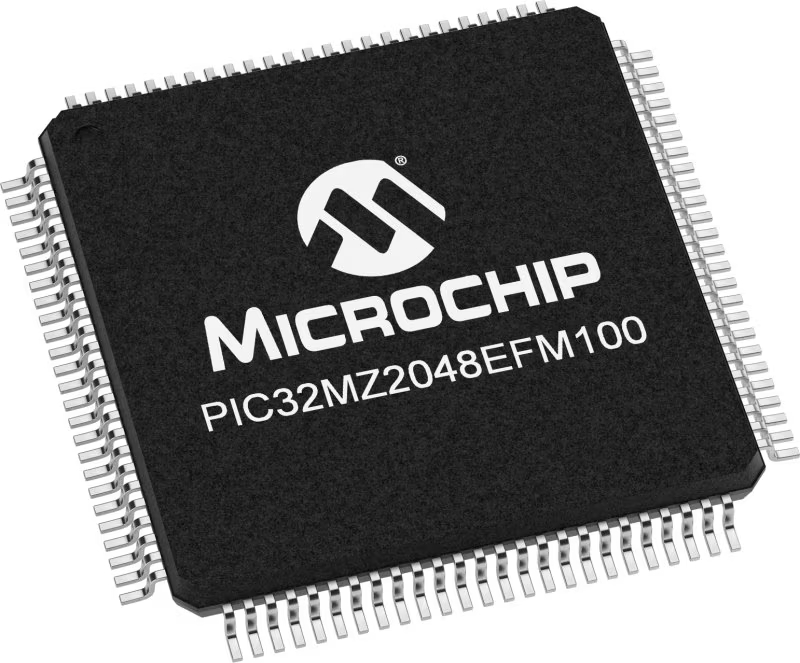
建筑
PIC32
MCU 内存 (KB)
2048
硅供应商
Microchip
引脚数
100
RAM (字节)
524288
使用的MCU引脚
mikroBUS™映射器
“仔细看看!”
Click board™ 原理图

一步一步来
项目组装
实时跟踪您的结果
应用程序输出
1. 应用程序输出 - 在调试模式下,“应用程序输出”窗口支持实时数据监控,直接提供执行结果的可视化。请按照提供的教程正确配置环境,以确保数据正确显示。

2. UART 终端 - 使用UART Terminal通过USB to UART converter监视数据传输,实现Click board™与开发系统之间的直接通信。请根据项目需求配置波特率和其他串行设置,以确保正常运行。有关分步设置说明,请参考提供的教程。
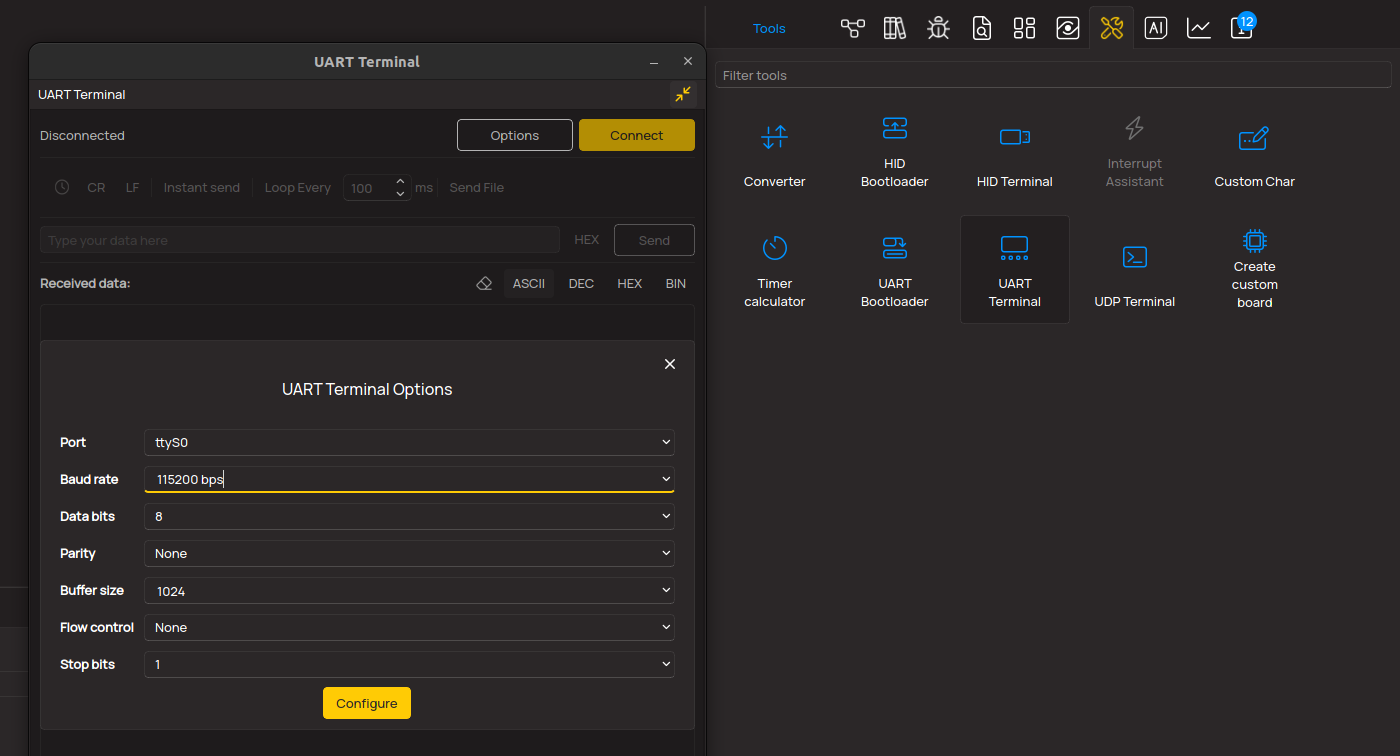
3. Plot 输出 - Plot功能提供了一种强大的方式来可视化实时传感器数据,使趋势分析、调试和多个数据点的对比变得更加直观。要正确设置,请按照提供的教程,其中包含使用Plot功能显示Click board™读数的分步示例。在代码中使用Plot功能时,请使用以下函数:plot(insert_graph_name, variable_name);。这是一个通用格式,用户需要将“insert_graph_name”替换为实际图表名称,并将“variable_name”替换为要显示的参数。
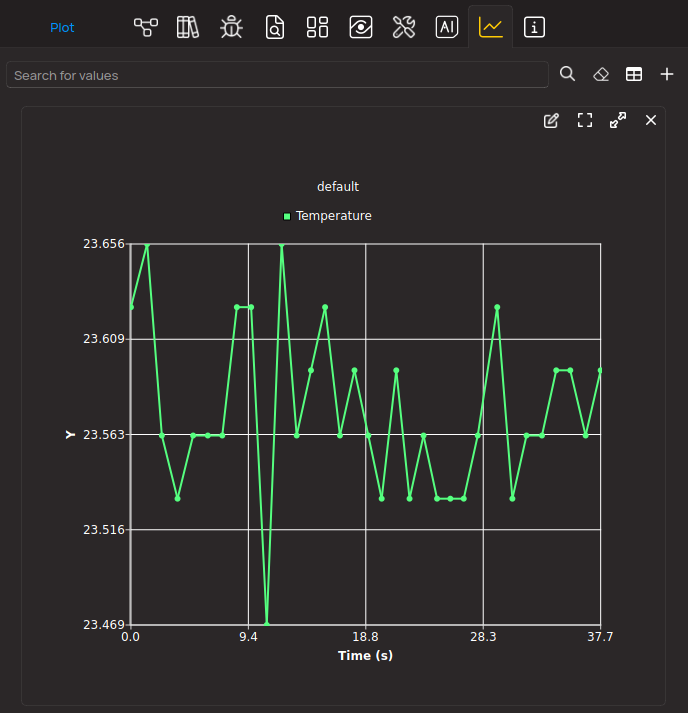
软件支持
库描述
该库包含 EnOcean 4 Click 驱动程序的 API。
关键功能:
enocean4_response_handler_set- 处理器设置功能。enocean4_process- 响应处理函数。enocean4_response_ready- 响应准备检查函数。
开源
代码示例
完整的应用程序代码和一个现成的项目可以通过NECTO Studio包管理器直接安装到NECTO Studio。 应用程序代码也可以在MIKROE的GitHub账户中找到。
/*!
* \file
* \brief Enocean4 Click example
*
* # Description
* This example reads and processes data from EnOcean 4 Clicks.
*
* The demo application is composed of two sections :
*
* ## Application Init
* Initializes the driver and configures the Click board.
*
* ## Application Task
* In the receiver mode, it waits for a telegram, then replies to it with the certain message.
* In the transmitter mode, first it sends the telegram with the certain message,
* then waits for a response.
*
* ## Additional Function
* - resp_message - Displays the response message on the USB UART.
* - packet_type - Displays the packet type message on the USB UART.
* - make_response - Driver handler function which stores data in the response buffer.
* - log_response - Displays a response on the USB UART.
* - send_telegram - Allows user to send a telegram to the determined destination.
* - check_response - Waits until response is ready, then displays it on the USB UART.
*
* \author MikroE Team
*
*/
// ------------------------------------------------------------------- INCLUDES
#include "board.h"
#include "log.h"
#include "enocean4.h"
#include "string.h"
// ------------------------------------------------------------------ VARIABLES
#define DEMO_APP_RECEIVER
// #define DEMO_APP_TRANSMITTER
#define DEMO_MESSAGE "MikroE"
#define DEMO_ANSWER "EnOcean 4"
enocean4_packet_t response;
enocean4_packet_t message;
uint8_t response_size_cnt;
uint8_t rsp_check;
uint8_t device_mode;
static enocean4_t enocean4;
static log_t logger;
// ------------------------------------------------------- ADDITIONAL FUNCTIONS
void resp_message( uint8_t resp_byte )
{
switch ( resp_byte )
{
case ENOCEAN4_RET_OK :
{
log_printf( &logger, "OK\r\n" );
break;
}
case ENOCEAN4_RET_ERROR :
{
log_printf( &logger, "ERROR\r\n" );
break;
}
case ENOCEAN4_RET_NOT_SUPPORTED :
{
log_printf( &logger, "NOT SUPPORTED\r\n" );
break;
}
case ENOCEAN4_RET_WRONG_PARAM :
{
log_printf( &logger, "WRONG PARAM\r\n" );
break;
}
case ENOCEAN4_RET_OP_DENIED :
{
log_printf( &logger, "OPERATION DENIED\r\n" );
break;
}
case ENOCEAN4_RET_LOCK_SET :
{
log_printf( &logger, "LOCK SET\r\n" );
break;
}
case ENOCEAN4_RET_BUFF_TO_SMALL :
{
log_printf( &logger, "BUFFER TO SMALL\r\n" );
break;
}
case ENOCEAN4_RET_NO_FREE_BUFF :
{
log_printf( &logger, "NO FREE BUFFER\r\n" );
break;
}
default :
{
log_printf( &logger, "0x%.2X\r\n", ( uint16_t ) resp_byte );
break;
}
}
}
void packet_type( )
{
switch ( response.packet_type )
{
case ENOCEAN4_PACK_TYPE_RADIO_ERP1 :
{
log_printf( &logger, "RADIO TELEGRAM : " );
break;
}
case ENOCEAN4_PACK_TYPE_RESPONSE :
{
log_printf( &logger, "RESPONSE : " );
break;
}
case ENOCEAN4_PACK_TYPE_RADIO_SUB_TEL :
{
log_printf( &logger, "RADIO SUBTELEGRAM : " );
break;
}
case ENOCEAN4_PACK_TYPE_EVENT :
{
log_printf( &logger, "EVENT : " );
break;
}
case ENOCEAN4_PACK_TYPE_COMMON_CMD :
{
log_printf( &logger, "COMMON COMMAND : " );
break;
}
case ENOCEAN4_PACK_TYPE_SMART_ACK_CMD :
{
log_printf( &logger, "SMART ACK COMMAND : " );
break;
}
case ENOCEAN4_PACK_TYPE_REMOTE_MAN_CMD :
{
log_printf( &logger, "REMOTE MAN COMMAND : " );
break;
}
case ENOCEAN4_PACK_TYPE_RADIO_MSG :
{
log_printf( &logger, "RADIO MESSAGE : " );
break;
}
case ENOCEAN4_PACK_TYPE_RADIO_ERP2 :
{
log_printf( &logger, "RADIO TELEGRAM ERP2 : " );
break;
}
case ENOCEAN4_PACK_TYPE_RADIO_802_15_4 :
{
log_printf( &logger, "802_15_4_RAW PACKET : " );
break;
}
case ENOCEAN4_PACK_TYPE_CMD_2_4 :
{
log_printf( &logger, "2.4 GHz COMMAND : " );
break;
}
default :
{
log_printf( &logger, "MSC - MESSAGE : " );
break;
}
}
}
void make_response( enocean4_packet_t *rsp, uint8_t *rsp_length_size )
{
uint16_t rsp_cnt;
for ( rsp_cnt = 0; rsp_cnt < rsp->data_length; rsp_cnt++ )
{
response.data_buff[ rsp_cnt ] = rsp->data_buff[ rsp_cnt ];
}
response.data_length = rsp->data_length;
response.opt_length = rsp->opt_length;
response.packet_type = rsp->packet_type;
response_size_cnt = *rsp_length_size;
}
void log_response( )
{
uint16_t rsp_cnt;
if ( rsp_check == 1 )
{
if ( ( response.packet_type == ENOCEAN4_PACK_TYPE_RESPONSE ) && ( response.data_length == 1 ) )
{
packet_type( );
resp_message( response.data_buff[ 0 ] );
return;
}
packet_type( );
rsp_check = 0;
}
if ( response.packet_type == ENOCEAN4_PACK_TYPE_RADIO_ERP1 )
{
for ( rsp_cnt = 1; rsp_cnt < response.data_length - 12; rsp_cnt++ )
{
log_printf( &logger, "%c", ( uint16_t ) response.data_buff[ rsp_cnt ] );
}
}
else
{
for ( rsp_cnt = 0; rsp_cnt < response.data_length; rsp_cnt++ )
{
log_printf( &logger, "0x%.2X ", ( uint16_t ) response.data_buff[ rsp_cnt ] );
}
}
if ( response_size_cnt == 0 )
{
log_printf( &logger, "\r\n" );
rsp_check = 1;
}
}
void send_telegram ( char *telegram, uint8_t tel_type )
{
uint16_t tel_length;
uint16_t tel_idx;
char *chr_ptr;
tel_length = 0;
chr_ptr = telegram;
while ( *chr_ptr != 0 )
{
tel_length++;
chr_ptr++;
}
// Packet Header
if ( tel_type == ENOCEAN4_RORG_ADT )
{
message.opt_length = 7;
}
else
{
message.opt_length = 0;
}
message.data_length = 6 + tel_length;
message.packet_type = ENOCEAN4_PACK_TYPE_RADIO_ERP1;
message.data_buff[ 0 ] = tel_type;
// Telegram Data
chr_ptr = telegram;
for ( tel_idx = 0; tel_idx < tel_length; tel_idx++ )
{
message.data_buff[ tel_idx + 1 ] = *chr_ptr;
chr_ptr++;
}
// Sender ID
message.data_buff[ tel_length + 1 ] = 0x04;
message.data_buff[ tel_length + 2 ] = 0x10;
message.data_buff[ tel_length + 3 ] = 0x0B;
message.data_buff[ tel_length + 4 ] = 0x8B;
// Status
message.data_buff[ tel_length + 5 ] = 0x00;
// Number of sub telegram
message.data_buff[ tel_length + 6 ] = 0x03;
// Destination ID
message.data_buff[ tel_length + 7 ] = 0x04;
message.data_buff[ tel_length + 8 ] = 0x10;
message.data_buff[ tel_length + 9 ] = 0x0B;
message.data_buff[ tel_length + 10 ] = 0x81;
// dBm
message.data_buff[ tel_length + 11 ] = 0xFF;
// Security Level
message.data_buff[ tel_length + 12 ] = 0x00;
enocean4_send_packet( &enocean4, &message );
}
void check_response( )
{
uint8_t response_ready;
enocean4_uart_isr( &enocean4 );
response_ready = enocean4_response_ready( &enocean4 );
while ( response_ready != ENOCEAN4_RESPONSE_READY )
{
enocean4_uart_isr( &enocean4 );
response_ready = enocean4_response_ready( &enocean4 );
Delay_1ms( );
}
enocean4_process( &enocean4 );
log_response( );
}
// ------------------------------------------------------ APPLICATION FUNCTIONS
void application_init ( void )
{
log_cfg_t log_cfg;
enocean4_cfg_t cfg;
/**
* Logger initialization.
* Default baud rate: 115200
* Default log level: LOG_LEVEL_DEBUG
* @note If USB_UART_RX and USB_UART_TX
* are defined as HAL_PIN_NC, you will
* need to define them manually for log to work.
* See @b LOG_MAP_USB_UART macro definition for detailed explanation.
*/
LOG_MAP_USB_UART( log_cfg );
log_init( &logger, &log_cfg );
log_info( &logger, "---- Application Init ----" );
// Click initialization.
enocean4_cfg_setup( &cfg );
ENOCEAN4_MAP_MIKROBUS( cfg, MIKROBUS_1 );
enocean4_init( &enocean4, &cfg );
Delay_ms ( 500 );
enocean4_response_handler_set( &enocean4, &make_response );
Delay_ms ( 300 );
rsp_check = 1;
enocean4_reset( &enocean4 );
log_printf( &logger, "** EnOcean 4 initialization done **\r\n" );
log_printf( &logger, "***********************************\r\n" );
Delay_ms ( 500 );
// Clearing RX buffer
{
uint8_t tmp_buf[ 100 ];
enocean4_generic_read( &enocean4, tmp_buf, 100 );
}
log_printf( &logger, "Device version reading...\r\n" );
message.data_length = 0x0001;
message.opt_length = 0x00;
message.packet_type = ENOCEAN4_PACK_TYPE_COMMON_CMD;
message.data_buff[ 0 ] = ENOCEAN4_CMD_CO_RD_VERSION;
enocean4_send_packet( &enocean4, &message );
check_response( );
log_printf( &logger, "***********************************\r\n" );
Delay_ms ( 1000 );
Delay_ms ( 500 );
log_printf( &logger, "Add filter to filter list...\r\n" );
message.data_length = 0x0007;
message.opt_length = 0x00;
message.packet_type = ENOCEAN4_PACK_TYPE_COMMON_CMD;
message.data_buff[ 0 ] = ENOCEAN4_CMD_CO_WR_FILTER_ADD;
message.data_buff[ 1 ] = ENOCEAN4_FILTER_TYPE_RORG;
message.data_buff[ 2 ] = 0x00;
message.data_buff[ 3 ] = 0x00;
message.data_buff[ 4 ] = 0x00;
message.data_buff[ 5 ] = ENOCEAN4_RORG_ADT;
message.data_buff[ 6 ] = ENOCEAN4_APPLY_RADIO_INTER;
enocean4_send_packet( &enocean4, &message );
check_response( );
log_printf( &logger, "***********************************\r\n" );
Delay_ms ( 1000 );
Delay_ms ( 500 );
log_printf( &logger, "Supplied filters reading...\r\n" );
message.data_length = 0x0001;
message.opt_length = 0x00;
message.packet_type = ENOCEAN4_PACK_TYPE_COMMON_CMD;
message.data_buff[ 0 ] = ENOCEAN4_CMD_CO_RD_FILTER;
enocean4_send_packet( &enocean4, &message );
check_response( );
log_printf( &logger, "***********************************\r\n" );
log_printf( &logger, "Ready to exchange telegrams\r\n" );
log_printf( &logger, "***********************************\r\n" );
Delay_ms ( 1000 );
Delay_ms ( 500 );
}
void application_task ( void )
{
#ifdef DEMO_APP_RECEIVER
log_printf( &logger, "Waiting for a telegram...\r\n" );
check_response( );
log_printf( &logger, "***********************************\r\n" );
log_printf( &logger, "Replying to the received telegram...\r\n" );
send_telegram( DEMO_ANSWER, ENOCEAN4_RORG_ADT );
check_response( );
log_printf( &logger, "***********************************\r\n" );
#endif
#ifdef DEMO_APP_TRANSMITTER
log_printf( &logger, "Sending a telegram...\r\n" );
send_telegram( DEMO_MESSAGE, ENOCEAN4_RORG_ADT );
check_response( );
log_printf( &logger, "***********************************\r\n" );
log_printf( &logger, "Waiting for a response...\r\n" );
check_response( );
log_printf( &logger, "***********************************\r\n" );
Delay_ms ( 1000 );
Delay_ms ( 1000 );
Delay_ms ( 1000 );
Delay_ms ( 1000 );
Delay_ms ( 1000 );
#endif
}
int main ( void )
{
/* Do not remove this line or clock might not be set correctly. */
#ifdef PREINIT_SUPPORTED
preinit();
#endif
application_init( );
for ( ; ; )
{
application_task( );
}
return 0;
}
// ------------------------------------------------------------------------ END


















